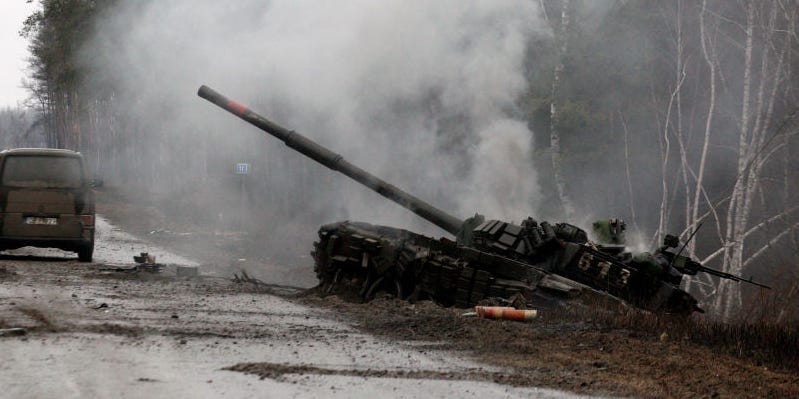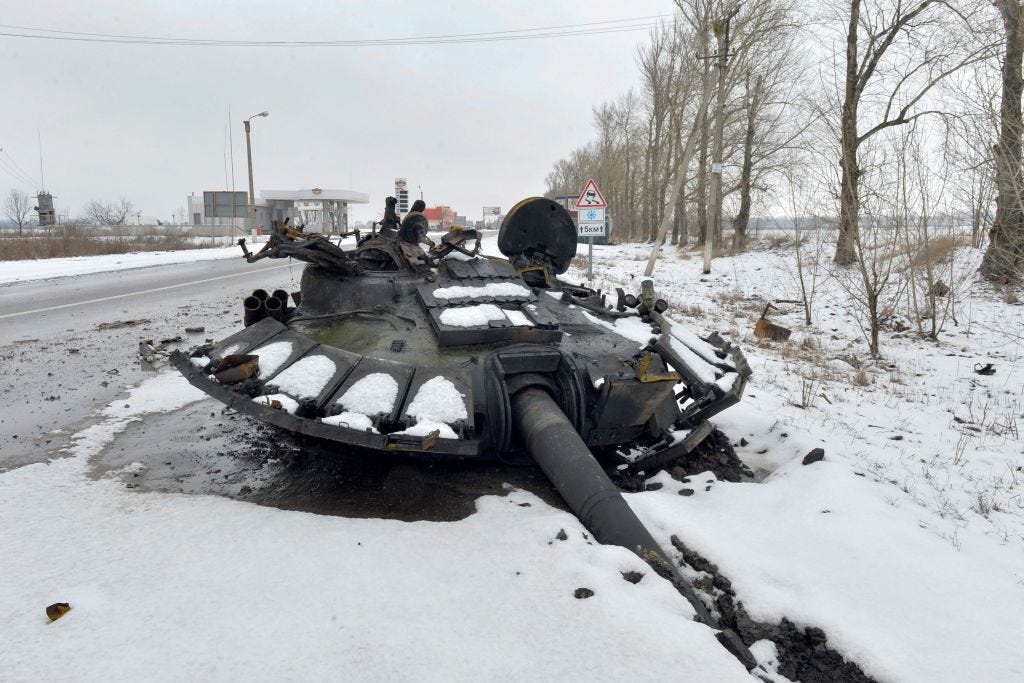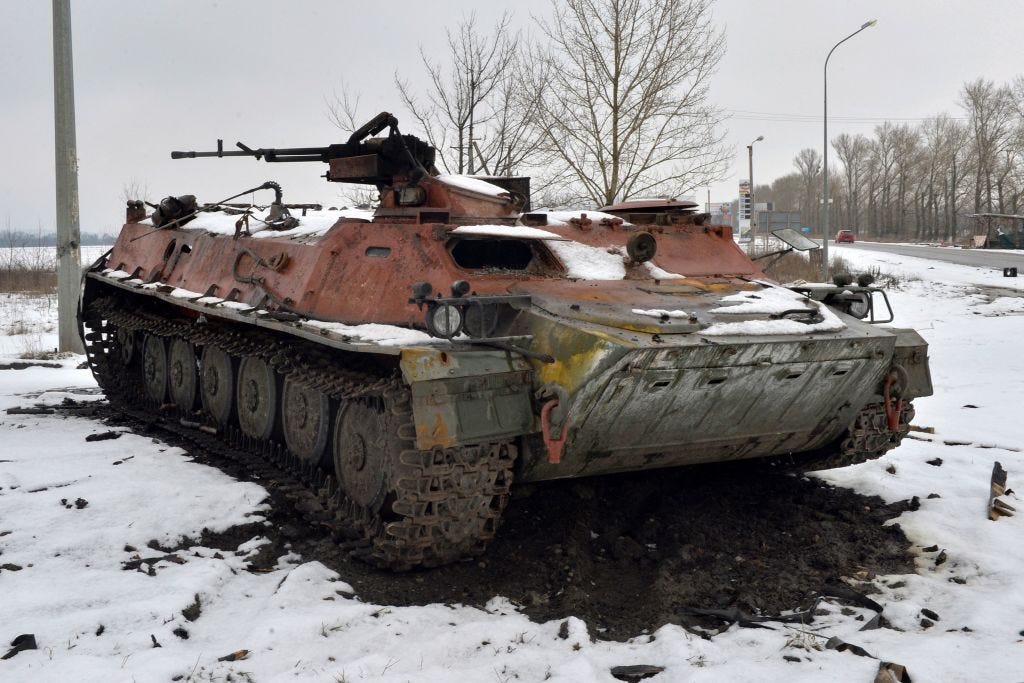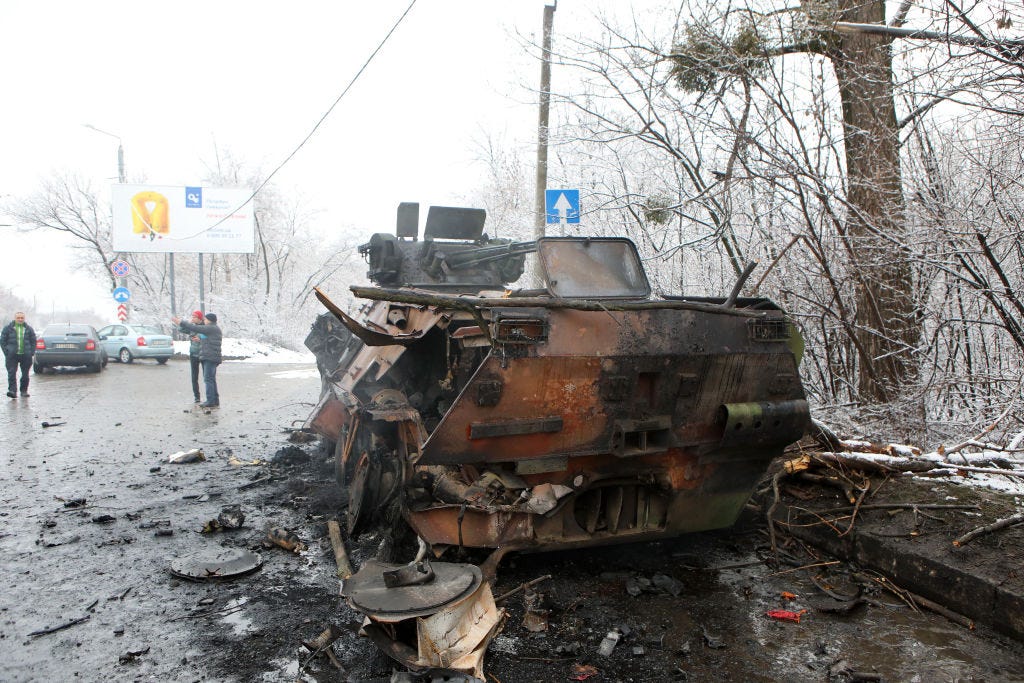
- The initial days of Russia's invasion of Ukraine have included "operational blunders," experts say.
- Russia has not been fighting as well as expected and Ukraine is putting up a solid resistance.
- Experts say the Kremlin miscalculated, leading to "dumb" mistakes on the part of the Russian military.
Russia's invasion of Ukraine does not appear to be going as its leaders had planned. Its forces have stumbled from their own failures and fierce Ukrainian resistance, but the outcome may be far from decided. Experts and officials say Moscow may adjust its approach and intensify its attacks, even as international outrage grows.
Russia's multi-pronged advance on the capital, Kyiv, "still appears to be their main line of effort," a senior US defense official said Monday. That attack has advanced only about 5 kilometers in the past day and is now about 25 kilometers from the city center. Ukrainian President Volodymyr Zelenskyy has been rallying his country to resist the Russian assault from Kyiv despite the rising risks.
"Certainly they have been slowed and they have been frustrated by their lack of progress on Kyiv," the official told reporters. "One of the things that could result is a reevaluation of their tactics and the potential for them to be more aggressive and more overt in both the size and scale of their targeting of Kyiv."
In addition to halted efforts to take the capital, there continues to be intense fighting around Kharkiv in Ukraine's northeast, and Russian forces are advancing on the port city of Mariupol the southeast.
Capturing these cities could allow Russia to "section off" eastern Ukraine and any troops fighting there, "but again, they haven't taken Kharkiv and they haven't taken Mariupol," the official said.
The airspace over much of Ukraine remains contested, the official said Monday, contradicting some Russian claims that its forces have air superiority. Footage of aerial battles and of aircraft downed by air-defense systems continues to appear online, as do images and videos of destroyed Russian tanks and vehicles.
US intelligence predicted Kyiv could fall in a matter of days, but the city continues to hold out. Ukrainians are putting up a "very stiff and very effective defense" around their capital, the defense official said.
"The slowness of the advance, we believe, is certainly due to that resistance, but it is also due to logistical and sustainment issues that the Russians have had," the official added, noting that it is unclear if those challenges were caused by the Ukrainian forces or the Russians themselves.
'A lot of dumb Russian mistakes'

Russia has made a "mess" of its invasion, CNA Russia expert Michael Kofman wrote on Twitter, writing that "this operation looks terrible."
Some of the ways Russia has conducted its offensive against Ukraine are a mystery, such as its failure to utilize its aviation assets to swiftly achieve air superiority early in the conflict, but a lot of what is being seen can be attributed to failed assumptions on the part of the Russians, experts said.
"What I think you have here is the Russian strategy assumed they would face little resistance from the Ukrainians, they could surround Kyiv in a matter of days and that the Ukrainian military just wouldn't put up much resistance at all," Jeffrey Edmonds, a former CIA military analyst and a Russia expert at CNA, told Insider on Monday.
Russia "seems to have expected something much easier than what they're up against now," Edmonds added.
Russia's planning for the campaign appears to have assumed there would have been little resistance and that Russian forces could move quickly enough to force a Ukrainian collapse before the international community could mount a robust response, Kofman told War on the Rocks on Sunday.
The Russian objective "was to seize small towns and junctions, rush to the capitol in the north as fast as they could, and then rush forward down roads, isolate Ukrainian forces, give the sense of encirclement, the sense of rapid defeat so Zelenskyy would surrender," he said, referring to Ukrainian President Volodymyr Zelenskyy.
Edmonds said Russia's misguided assumptions, along with problematic political influences, seem to have led to "operational blunders" such as conducting air-assault operations without follow-on support, sending military convoys into ambushes, and logistical nightmares. Russian forces have also demonstrated some confusion about the mission and operational planning.

Russia was expected to use a combined-arms approach, using heavy firepower to enable the movement of forces in battalion tactical groups — units of several hundred soldiers with armor and artillery, experts said.
Instead, Russian military commanders took several battalions and "pushed them along the roads to rapidly seize" key points and "make forward progress," Kofman explained.
"They're not actually employing battalion tactical groups," he said. "You often see detachments widely separated. Tanks without infantry. Infantry without tanks."
Mason Clark, lead Russia analyst at the Institute for the Study of War, told Insider that "the Kremlin simply miscalculated and expected the Ukrainian military to collapse far quicker than it has" and that "they probably didn't think they needed full cohesive units driving in."
"It's led to a lot of dumb Russian mistakes," he said, pointing to units getting isolated or launching unsupported attacks against heavily defended positions.
It's not just that the Russians have poorly executed the starting phases of this fight. "It's definitely a mix of Russians are carrying out this offensive very badly and the Ukrainian military is seemingly better and has a much higher morale than anyone, most importantly the Russians, anticipated," Clark said.

Russia has struggled to hold captured airfields, and its advances on key cities, like Kyiv and Kharkiv, have been repelled by Ukraine's military and by ordinary civilians armed with state-issued rifles and homemade weapons.
Moscow has not acknowledged these challenges, and it has only recently admitted to taking losses in the conflict, which it characterizes as a "special military operation."
"Russian servicemen are showing courage and heroism while fulfilling combat tasks in the special military operation," Russian military spokesman Igor Konashenkov said on state television on Sunday, adding that "unfortunately, there are killed and injured among our comrades."
Edmonds said that the current invasion of Ukraine is not the type of conflict for which Russia typically trains. Russia usually trains to fight a superior force, such as a combined NATO force.
"Most Russian units have not made it into this fight," Kofman said. "People don't get that. They don't understand that this is the war, but it's not a war that the Russian military trained to fight."
Russia has significant military capabilities that have yet to be brought in, and US officials and experts caution that Moscow may yet change its approach, adding firepower and adopting more brutal tactics.
The defense official said Monday that the Russians are "going to adapt, and they're going to try to overcome, and as they do that adaptation it's possible that they could change their plans and how they want to go after Kyiv to be less discriminant."
There have been numerous reports of multiple-launch rocket systems and artillery striking civilian areas, though it could not be determined if those strikes were deliberate.
"They are causing civilian harm and they are striking civilian targets. Whether it's intentional and directed, we're just not in a position to be able to confirm that," the official said.
Those damaging attacks and civilian casualties from them are expected to increase as the fighting increases around major Ukrainian cities. Kofman pointed to Russia's deployment of Chechen troops as cause for concern.
"That's a set of fighters that have been brought in to engage in the viciousness of urban warfare, and I've seen quite a few of those kind of troops being brought in, particularly in the last couple of days," Kofman said Sunday.
Russia's missteps on the battlefield so far come as Russian President Vladimir Putin's reputation is on the line, which may lead to escalation rather than de-escalation in the days ahead.
"It is unclear what to expect from him," Edmonds said of Putin, "but I would not expect him to do nothing."